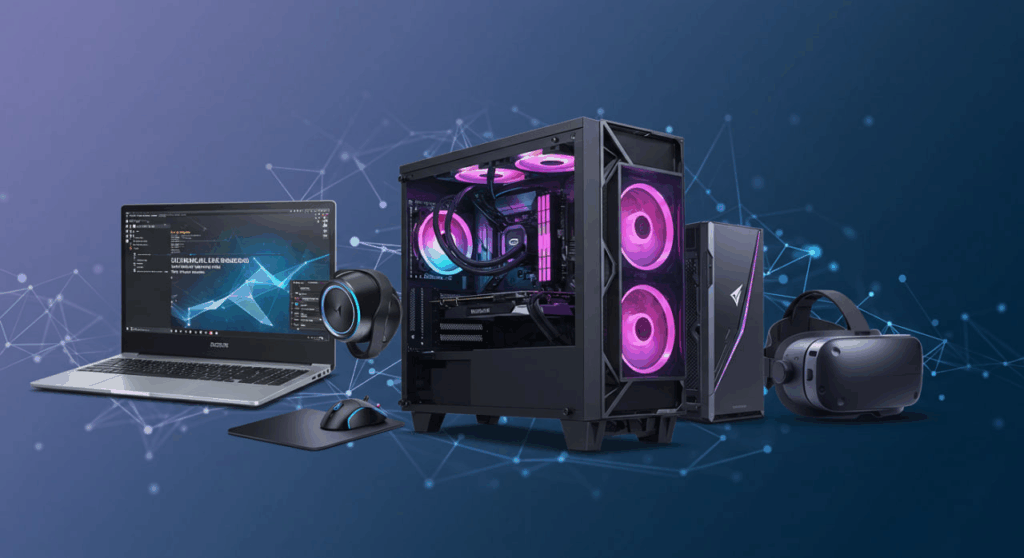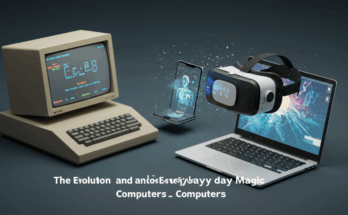In today’s fast-paced digital world, selecting the right computer can feel like navigating a labyrinth. With an overwhelming array of options—laptops, desktops, all-in-ones, and hybrids—each boasting cutting-edge features, it’s easy to get lost in the specs and jargon. Whether you’re a student, a professional, a gamer, or a casual user, your computer is the backbone of your productivity and entertainment. This comprehensive guide dives deep into the world of computers in 2025, reviewing the latest trends, top models, and key considerations to help you make an informed decision. From performance to portability, we’ve got you covered with insights that balance technical depth with practical advice.
Why Choosing the Right Computer Matters
Your computer isn’t just a tool; it’s an extension of your lifestyle. A well-chosen device can streamline your workflow, enhance your gaming experience, or make binge-watching your favorite series a visual delight. In 2025, computers are more powerful and versatile than ever, with advancements in AI integration, display technology, and energy efficiency. However, a mismatch between your needs and your device can lead to frustration—whether it’s a sluggish laptop struggling with multitasking or a bulky desktop eating up your workspace. This guide will break down the critical factors to consider, ensuring you invest in a machine that aligns perfectly with your goals.
Key Factors to Consider When Buying a Computer
Before diving into specific models, let’s explore the essential elements that define a computer’s performance and suitability. These factors will guide you in narrowing down your options and ensuring your choice meets both current and future needs.
Performance: CPU, GPU, and RAM
The heart of any computer lies in its processor (CPU), graphics card (GPU), and memory (RAM). In 2025, CPUs like Intel’s Core Ultra 9 and AMD’s Ryzen 9 9900X dominate the market with multi-core performance, ideal for tasks like video editing, 3D rendering, and gaming. If you’re a creative professional or gamer, a dedicated GPU, such as NVIDIA’s GeForce RTX 5090, delivers stunning visuals and smooth frame rates. For most users, 16GB of RAM is the sweet spot for multitasking, while power users may opt for 32GB or more to handle demanding applications seamlessly.
Portability vs. Power: Laptops vs. Desktops
Your lifestyle dictates whether a laptop or desktop is the better fit. Laptops offer unmatched portability, perfect for students or remote workers who need to move between locations. Models like the Dell XPS 15 (2025) combine sleek designs with powerful internals, making them versatile for work and play. Desktops, on the other hand, provide superior performance and upgradability. A pre-built desktop like the Alienware Aurora R17 offers customizable components and robust cooling, ideal for gamers and professionals who prioritize raw power over mobility.

Operating System: Windows, macOS, or Linux?
The operating system (OS) shapes your user experience. Windows remains the most versatile, supporting a wide range of software and hardware, making it a go-to for gamers and professionals. macOS, found on Apple’s MacBooks and iMacs, offers a polished, intuitive interface and seamless integration with other Apple devices, perfect for creatives and those in the Apple ecosystem. Linux, favored by developers and tech enthusiasts, provides unmatched customization but may require technical know-how. Your choice depends on your software needs and comfort level with each platform.
Display and Design
A computer’s display and build quality significantly impact user experience. In 2025, OLED and Mini-LED displays are standard in premium laptops, offering vibrant colors and deep blacks for immersive viewing. For example, the ASUS ZenBook Pro Duo’s 4K OLED dual-screen setup is a game-changer for multitaskers. Build quality matters too—look for durable materials like aluminum or magnesium alloy for laptops, and ergonomic designs for desktops to ensure comfort during long sessions.
Battery Life and Connectivity
For laptops, battery life is a critical consideration. Top models like the MacBook Pro 16-inch (M4 Max) boast up to 22 hours of battery life, making them ideal for all-day use. Connectivity is equally important—ensure your device has modern ports like USB-C, Thunderbolt 5, or HDMI 2.1, and supports Wi-Fi 7 for blazing-fast internet. Desktops may prioritize expandability, with multiple USB ports and support for external monitors to create a robust workstation.
Top Computers to Consider in 2025
With the basics covered, let’s review some of the standout computers available in 2025, catering to different needs and budgets. Each model has been selected for its performance, design, and value, ensuring there’s something for everyone.
Best Overall: Apple MacBook Pro 16-inch (M4 Max)
The MacBook Pro 16-inch with the M4 Max chip is a powerhouse that blends performance, portability, and elegance. Its 16-core CPU and 40-core GPU handle everything from 8K video editing to machine learning tasks with ease. The Liquid Retina XDR display delivers stunning visuals, while the 22-hour battery life ensures uninterrupted productivity. With a sleek aluminum chassis and a refined Magic Keyboard, it’s a premium choice for professionals and creatives. However, its high price tag may deter budget-conscious buyers.
Pros:
- Unmatched performance for creative workloads
- Exceptional display and battery life
- Premium build quality
Cons:
- Expensive
- Limited upgradability
Best for Gaming: Alienware Aurora R17
For gamers, the Alienware Aurora R17 is a beast. Powered by AMD’s Ryzen 9 9900X and NVIDIA’s RTX 5090, it delivers blistering performance for AAA titles at 4K resolution. Its customizable RGB lighting and advanced cooling system keep things cool during intense sessions. With ample ports and easy upgradability, it’s a future-proof choice for enthusiasts. The downside? Its size and price may not suit casual gamers or those with limited space.
Pros:
- Top-tier gaming performance
- Highly customizable
- Excellent cooling
Cons:
- Bulky design
- Premium price
Best Budget Option: Acer Aspire 5 (2025)
The Acer Aspire 5 strikes a balance between affordability and performance. Equipped with an Intel Core i5-14500H processor and 16GB of RAM, it handles everyday tasks like browsing, streaming, and light productivity with ease. Its 15.6-inch Full HD display is crisp, and the 10-hour battery life supports all-day use. While it lacks the power for heavy gaming or video editing, it’s an excellent choice for students and casual users on a budget.
Pros:
- Affordable price
- Solid performance for everyday tasks
- Decent battery life
Cons:
- No dedicated GPU
- Average build quality
Best for Portability: Lenovo Yoga Slim 7i
The Lenovo Yoga Slim 7i is a lightweight marvel, weighing just 2.8 pounds. Its Intel Core Ultra 7 processor and 14-inch 2.8K OLED display make it a stellar choice for professionals on the go. With 12 hours of battery life and a robust set of ports, including Thunderbolt 5, it’s versatile and future-ready. However, its slim design limits upgradability, and it’s not ideal for resource-intensive tasks like gaming.
Pros:
- Ultra-portable design
- Vibrant OLED display
- Strong connectivity options
Cons:
- Limited upgradability
- Not suited for heavy workloads
Trends Shaping Computers in 2025
The computer industry is evolving rapidly, and 2025 brings exciting advancements that redefine what these machines can do. AI integration is at the forefront, with chips like Apple’s M4 and Intel’s Core Ultra series featuring dedicated neural engines for tasks like real-time language translation and photo editing. Sustainability is another focus, with manufacturers like Dell and HP using recycled materials and energy-efficient components. Foldable and dual-screen laptops, such as the ASUS ZenBook Pro Duo, are gaining traction, offering innovative ways to multitask. Finally, Wi-Fi 7 and 5G connectivity are becoming standard, ensuring faster and more reliable internet access.
Tips for a Future-Proof Purchase
To ensure your computer remains relevant for years, consider these tips:
- Prioritize Scalability: Opt for devices with upgradeable RAM or storage, especially for desktops.
- Future-Ready Ports: Look for USB-C, Thunderbolt 5, or Wi-Fi 7 to stay compatible with new peripherals.
- Invest in Quality: Spending a bit more on a reputable brand can save you from frequent repairs or replacements.
- Check Software Support: Ensure your OS and software will receive updates for at least 5-7 years.
FAQ
What is the best computer for students in 2025?
The Acer Aspire 5 is an excellent choice for students due to its affordability, reliable performance, and decent battery life. For those needing more power, the Lenovo Yoga Slim 7i offers portability and a vibrant display, ideal for note-taking and multitasking.
Should I choose a laptop or a desktop?
Laptops are best for portability and flexibility, while desktops offer superior performance and upgradability. If you work from multiple locations, go for a laptop like the MacBook Pro. For gaming or heavy workloads at a fixed location, a desktop like the Alienware Aurora R17 is ideal.
How much RAM do I need?
For casual users, 8GB is sufficient, but 16GB is recommended for multitasking or light creative work. Professionals and gamers should aim for 32GB or more to handle demanding applications.
Is macOS or Windows better for creative work?
macOS is favored for its optimized software ecosystem, especially for tools like Final Cut Pro and Logic Pro. Windows offers broader software compatibility and is better for users needing diverse applications or gaming.
How long will a 2025 computer last?
With proper care and updates, a high-quality computer purchased in 2025 can last 5-7 years. Opt for models with modern processors, ample RAM, and future-ready connectivity to maximize longevity.



